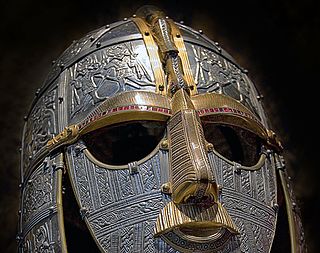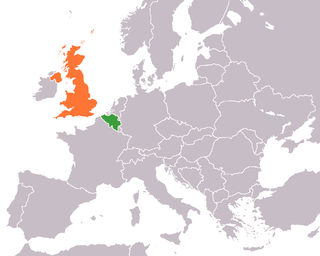The Anglo-Belgian Society is an organisation whose purpose is "to maintain and develop on a personal level the friendship which has always existed between the British and Belgian people and to commemorate the brotherhood in arms which arose from their mutual loyalty to the treaty of 1839". It was founded in 1983, incorporating the Anglo-Belgian Union (A-BU) (founded 1918) and Cercle Royal Belge de Londres (founded 1922). Its members include Belgians living in Britain, and British people and companies with an interest in Belgium. As of 2009 [update] it has nearly 500 members.

The Anglo-Saxons were a cultural group that inhabited much of what is now England in the Early Middle Ages, and spoke Old English. They traced their origins to Germanic settlers who came to Britain from mainland Europe in the 5th century. Although the details are not clear, their cultural identity developed out of the interaction of these settlers with the pre-existing Romano-British culture. Over time, most of the people of what is now southern, central, northern and eastern England came to identify as Anglo-Saxon and speak Old English. Danish and Norman invasions later changed the situation significantly, but their language and political structures are the direct predecessors of the medieval Kingdom of England, and the Middle English language. Although the modern English language owes somewhat less than 26% of its words to Old English, this includes the vast majority of words used in everyday speech.

British Israelism is the British nationalist, pseudoarchaeological, pseudohistorical and pseudoreligious belief that the people of Great Britain are "genetically, racially, and linguistically the direct descendants" of the Ten Lost Tribes of ancient Israel. With roots in the 16th century, British Israelism was inspired by several 19th century English writings such as John Wilson's 1840 Our Israelitish Origin. From the 1870s onward, numerous independent British Israelite organizations were set up throughout the British Empire as well as in the United States; as of the early 21st century, a number of these organizations are still active. In the United States, the idea gave rise to the Christian Identity movement.

The Norsemen were a North Germanic ethnolinguistic group of the Early Middle Ages, during which they spoke the Old Norse language. The language belongs to the North Germanic branch of the Indo-European languages and is the predecessor of the modern Germanic languages of Scandinavia. During the late eighth century, Scandinavians embarked on a large-scale expansion in all directions, giving rise to the Viking Age. In English-language scholarship since the 19th century, Norse seafaring traders, settlers and warriors have commonly been referred to as Vikings. Historians of Anglo-Saxon England distinguish between Norse Vikings (Norsemen) from Norway, who mainly invaded and occupied the islands north and north-west of Britain, as well as Ireland and western Britain, and Danish Vikings, who principally invaded and occupied eastern Britain.

In the United States, White Anglo-Saxon Protestants or WASP is a sociological term which is often used to describe white Protestant Americans who are generally part of the white dominant culture or upper-class and historically often the Mainline Protestant elite. Historically or most consistently, WASPS are of British descent, though the definition of WASP varies in this respect. WASPs have dominated American society, culture, and politics for most of the history of the United States. Critics have disparaged them as "The Establishment". Although the social influence of wealthy WASPs has declined since the 1960s, the group continues to play a central role in American finance, politics and philanthropy.
The Anglo-German Fellowship was a membership organisation that existed from 1935 to 1939, and aimed to build up friendship between the United Kingdom and Germany. It was sometimes perceived as being allied to Nazism. Previous groups in Britain with the same aims had been wound up when Adolf Hitler came to power.

Anglo-Indian people fall into three different groups: people of mixed-race origin with Indian and British ancestry, people of unmixed Indian descent born or living in the United Kingdom, and people of unmixed British descent born or living in India. The latter sense is now mostly historical. People fitting the middle definition are more usually known as British Asian or British Indian. This article focuses primarily on the modern definition, a distinct minority community of mixed-race Eurasian ancestry, whose first language is ordinarily English.

Sub-Roman Britain is the period of late antiquity in Great Britain between the end of Roman rule and the Anglo-Saxon settlement. The term was originally used to describe archaeological remains found in 5th- and 6th-century AD sites that hinted at the decay of locally made wares from a previous higher standard under the Roman Empire. It is now used to describe the period that commenced with the recall of Roman troops to Gaul by Constantine III in 407 and to have concluded with the Battle of Deorham in 577.

Anglo-Saxon paganism, sometimes termed Anglo-Saxon heathenism, Anglo-Saxon pre-Christian religion, or Anglo-Saxon traditional religion, refers to the religious beliefs and practices followed by the Anglo-Saxons between the 5th and 8th centuries AD, during the initial period of Early Medieval England. A variant of Germanic paganism found across much of north-western Europe, it encompassed a heterogeneous variety of beliefs and cultic practices, with much regional variation.
The Anglo-Norse Society in London is a society based in England for advancing the education of the citizens of Britain and Norway about each other's country and way of life.
Sir David Mackenzie Wilson, FBA is a British archaeologist, art historian, and museum curator, specialising in Anglo-Saxon art and the Viking Age. From 1977 until 1992 he served as the Director of the British Museum, where he had previously worked, from 1955 to 1964, as an assistant keeper. In his role as director of the museum, he became embroiled in the controversy over the ownership of the Elgin Marbles with the Greek government, engaging with a "disastrous" televised debate with Greek Minister of Culture Melina Mercouri.

Belgium–United Kingdom relations are foreign relations between Belgium and the United Kingdom. Belgium has an embassy in London and 8 honorary consulates. The United Kingdom has an embassy in Brussels.
Buddhism in the United Kingdom has a small but growing number of adherents which, according to a Buddhist organisation, is mainly a result of conversion. In the UK census for 2011, there were about 247,743 people who registered their religion as Buddhism, and about 174,000 who cited religions other than Christianity, Buddhism, Hinduism, Judaism, Islam, Jainism and Sikhism. This latter figure is likely to include some people who follow the traditional Chinese folk religion which also includes some elements of Buddhism.

The Anglo-Belgian Club was a private members' club located in Northumberland Avenue, London.
Continental Freemasonry, otherwise known as Liberal Freemasonry, Latin Freemasonry, and Adogmatic Freemasonry, includes the Masonic lodges, primarily on the European continent, that recognize the Grand Orient de France (GOdF) or belong to CLIPSAS, SIMPA, TRACIA **, CIMAS, COMAM, CATENA, GLUA, or any of various other international organizations of Liberal, i.e., Continental Freemasonry. The larger number of Freemasons, most of whom live in the United States–where Regular Freemasonry holds a virtual monopoly–belong to Masonic lodges that recognize the United Grand Lodge of England and do not recognize Continental Freemasons, regarding them as "irregular".
The genetic history of the British Isles is the subject of research within the larger field of human population genetics. It has developed in parallel with DNA testing technologies capable of identifying genetic similarities and differences between both modern and ancient populations. The conclusions of population genetics regarding the British Isles in turn draw upon and contribute to the larger field of understanding the history of the human occupation of the area, complementing work in linguistics, archaeology, history and genealogy.
The English people are an ethnic group and nation native to England, who speak the English language, a West Germanic language, and share a common history and culture. The English identity began with the Anglo-Saxons, when they were known as the Angelcynn, meaning race or tribe of the Angles. Their ethnonym is derived from the Angles, one of the Germanic peoples who migrated to Britain around the 5th century AD.

The settlement of Great Britain by diverse Germanic peoples, who eventually developed a common cultural identity as Anglo-Saxons, changed the language and culture of most of what became England from Romano-British to Germanic. This process principally occurred from the mid-fifth to early seventh centuries, following the end of Roman rule in Britain around the year 410. The settlement was followed by the establishment of the Heptarchy, Anglo-Saxon kingdoms in the south and east of Britain, later followed by the rest of modern England, and the south-east of modern Scotland. The exact nature of this change is a topic of on-going research. Questions remain about the scale, timing and nature of the settlements, and also about what happened to the previous residents of what is now England.
Burial in Anglo-Saxon England refers to the grave and burial customs followed by the Anglo-Saxons between the mid 5th and 11th centuries CE in Early Mediaeval England. The variation of the practice performed by the Anglo-Saxon peoples during this period, included the use of both cremation and inhumation. There is a commonality in the burial places between the rich and poor – their resting places sit alongside one another in shared cemeteries. Both of these forms of burial were typically accompanied by grave goods, which included food, jewelry, and weaponry. The actual burials themselves, whether of cremated or inhumed remains, were placed in a variety of sites, including in cemeteries, burial mounds or, more rarely, in ship burials.

The Anglo-Belgian Memorial, also known as the Belgian Gratitude Memorial, Belgian Refugees Memorial, or the Belgian Monument to the British Nation, is a war memorial on Victoria Embankment in London, opposite Cleopatra's Needle. It was a gift from Belgium, as a mark of thanks for assistance given by the UK during the First World War, and in particular for sheltering thousands of Belgian refugees who fled from the war. It is a Grade II* listed building.

The United Kingdom entered World War I on 4 August 1914, when King George V declared war after the expiry of an ultimatum to the German Empire. The official explanation focused on protecting Belgium as a neutral country; the main reason, however, was to prevent a French defeat that would have left Germany in control of Western Europe. The Liberal Party was in power with prime minister H. H. Asquith and foreign minister Edward Grey leading the way. The Liberal cabinet made the decision, although the party had been strongly anti-war until the last minute. The Conservative Party was pro-war. The Liberals knew that if they split on the war issue, they would lose control of the government to the Conservatives.